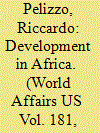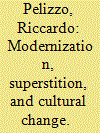|
|
|
Sort Order |
|
|
|
Items / Page
|
|
|
|
|
|
|
| Srl | Item |
| 1 |
ID:
193269


|
|
|
|
|
| Summary/Abstract |
By equating the traditional mindset with traditional beliefs (in magic, ritual, superstitions, etc.), several studies have consistently shown that such beliefs significantly influence people's political behavior and preferences. While these studies have highlighted the political consequences of a traditional mindset in several countries from the Global South, they nevertheless have little to say as to whether holding superstitious beliefs (e.g., believing in fortune tellers, horoscopes, or lucky charms) has certain political implications for countries in the Global North. In this article, we explore whether the traditional mindset has political consequences even in an industrially advanced Germany. We present an analysis of data from the German General Social Survey (GESIS 2019) showing that superstitious voters have less trust in the political system, are more inclined to think that Hitler would be remembered as a good stateman if he had not perpetrated the Holocaust, that the Nazi regime also had a good side, and that the Jews are different and, in any case, have too much influence. Hence, dissemination of superstitious beliefs could make right-wing populists more electorally appealing and successful than they once were. We believe our findings to be of some importance as they show that if the proliferation of superstitious beliefs continues unchecked, they may transform our political systems in ways that policy makers and democratic forces should strive to avoid.
|
|
|
|
|
|
|
|
|
|
|
|
|
|
|
|
| 2 |
ID:
182527


|
|
|
|
|
| Summary/Abstract |
The present article analyzes the debt–economic growth nexus in African countries while controlling for the impact of good governance indicators. In contrast to a long tradition of scholarship that has consistently suggested that government debt has a detrimental impact on economic growth in sub-Saharan Africa, recent studies have actually shown that government debt, when coupled with improvements in the quality of government, is actually a driver of economic growth. By analyzing an original dataset that covers the 2002–15 period and additional debt–economic growth data going up to the year 2020, we are able to suggest three conclusions. First, in the absence of debt, good governance matters in improving economic growth. Second, some dimensions of governance are better predictors of economic performance than others—as the “good enough governance” literature has in recent years suggested. Third, under no circumstances is debt government growth beneficial for the economic performance of African countries. Building on this evidence, we suggest that the COVID-19 pandemic—which has already slowed down African economies and increased their debt exposure—may prevent African countries from making greater progress along the developmental path.
|
|
|
|
|
|
|
|
|
|
|
|
|
|
|
|
| 3 |
ID:
163920


|
|
|
|
|
| Summary/Abstract |
The purpose of this article is to analyze Africa’s progress along the developmental path in the past few decades, to understand what factors were responsible for such success and to identify the risk factors that may compromise further development in the region in the years to come. We advance three basic claims: that Africa has experienced an almost unprecedented (by its standards) level of economic success in the first 15 years of the new millennium, that this success was made possible by a combination of domestic and supranational conditions, and that some of the enabling conditions that supported Africa’s growth and development in the new millennium may be disappearing. The study also suggests that while African countries may not be able to influence the global conditions on which their economic success depends, they do have the ability to influence the domestic conditions. This is why, we suggest, in addition to ensuring longer and healthier lives for their citizens, African countries should consolidate democracy and promote good governance.
|
|
|
|
|
|
|
|
|
|
|
|
|
|
|
|
| 4 |
ID:
182515


|
|
|
|
|
| Summary/Abstract |
Africa has experienced over a decade of sustained economic growth. However, since the outbreak of Ebola, there have been pertinent questions as to whether and what extent such outbreaks have developmental implications in the continent. It is in this context that this article investigates whether and to what extent the ongoing COVID-19 pandemic affects the development of Africa’s economies. Using data from various international organizations, we show that the pandemic has indeed slowed down African economies, albeit in differing degrees across various regions of the continent. However, the slowdown is moderate compared with economies in high-income countries and the world economies as a whole. We contend that while it is difficult to predict when the crisis is going to end, the continent can navigate itself out of it by leveraging on the ever-increasing global prices of agricultural products and natural resources.
|
|
|
|
|
|
|
|
|
|
|
|
|
|
|
|
| 5 |
ID:
193264


|
|
|
|
|
| Summary/Abstract |
This World Affairs 2023 special issue contains six contributions, including this one, exploring some of the key political consequences of traditional beliefs such as magic and superstition in the developing societies of the Global South as well as in certain industrially advanced societies of the Global North. To show why traditional beliefs matter, we provide an explanation in this introduction for why traditional beliefs exist in developing countries, why they survive in developed countries, and why they may become more popular over time. By utilizing a simple game theoretic approach, we explain why rational people can sometimes increase their payoffs by subscribing to a superstition while superstitious people never gain by switching to rationality. In fact, the superstition—which has no causal connection with the natural course of events—may even yield better results, not only for the individual but also for the group. This is the reason why, in the framework of evolutionary stable equilibrium, superstitious people can demographically dominate an entire population over time. In addition to explaining the existence and the persistence (or the popularity) of traditional beliefs, we highlight the key findings presented in the articles included in this special issue. All of them underline a cardinal point: traditional beliefs matter. They shape electoral behavior, they shape attitudes toward democratic governance, and they influence voters’ assessment of political figures and historical events. Precisely because traditional beliefs have such extensive implications for a country's political life, we believe that in the future scholars will have to pay greater attention to such beliefs to have a better understanding of political phenomena and trends.
|
|
|
|
|
|
|
|
|
|
|
|
|
|
|
|
| 6 |
ID:
193265


|
|
|
|
|
| Summary/Abstract |
By exploring the relationship between socioeconomic development, secularism, and the pervasiveness of traditional beliefs, this article shows that while some traditional practices and beliefs, such as making use of traditional healers, are negatively and significantly related to several development indicators, there is little to no detectable (statistical) relationship between other traditional beliefs and practices, such as believing in and seeing a jinn, and development. The evidence presented in the article sustains the claim, advanced at the turn of the millennium by Inglehart and Baker, that the impact of socioeconomic development on values, attitudes, and cultural change is complex and non-linear.
|
|
|
|
|
|
|
|
|
|
|
|
|
|
|
|
| 7 |
ID:
174740


|
|
|
|
|
| Summary/Abstract |
The severe acute respiratory syndrome coronavirus 2 (SARS-CoV-2) is neutral. It does not discriminate: the outbreak affects all countries. Yet, countries with better governance detect and report COVID-19 cases an average of 34 days earlier than countries with low governance scores. They also report a significantly higher number of cases, and more deaths but lower death-per-case ratios. Analyzing the statistical relationship between the good governance indicators devised by the World Bank with data pertaining to COVID-19 (to May 10, 2020), we present some initial yet strong statistical evidence that countries with higher levels of good governance based on the Worldwide Governance Indicators report more (cases, deaths), report earlier, and are more effective at reducing fatalities. These findings remain robust after controlling for population size, population density, old-age population, and the number of tourist arrivals. Countries with better governance are more successful in treating the disease and in reducing its deadliness. Good governance matters.
|
|
|
|
|
|
|
|
|
|
|
|
|
|
|
|
| 8 |
ID:
193267


|
|
|
|
|
| Summary/Abstract |
The party system literature has generally paid little attention to whether traditional beliefs have any impact on voters’ electoral behavior and the stability of party systems. The purpose of the present study shows that the stability of party systems and the pervasiveness of traditional beliefs go hand-in-hand. This article is expected to advance the scholarly understanding of the political consequences of traditional beliefs by showing that voters who hold traditional beliefs or engage in traditional practices are not simply less likely to have pro-democratic attitudes or have a greater appreciation of dictatorial rule, but also more likely to vote for ruling parties in elections. The evidence presented in the article sustains a basic claim; namely, that the pervasiveness of traditional beliefs in Togolese society should be regarded as one of the determinants of the party system's stability.
|
|
|
|
|
|
|
|
|
|
|
|
|
|
|
|
| 9 |
ID:
193268


|
|
|
|
|
| Summary/Abstract |
The new modernization theory has suggested that the pervasiveness of traditional values has a clear impact on the quality of democratic governance. In this contribution to this special issue on the political consequences of traditional beliefs, we explore whether and to what extent the pervasiveness of traditional values and beliefs has a detectable impact on authoritarian attitudes. Specifically, we analyze the relationship between the support for a “strongman” and the acceptability of traditional practices for Muslim respondents from 27 jurisdictions. The results suggest that those who believe that traditional practices, such as the use of sorcery, appealing to jinn, and to the souls of ancestors, are acceptable under Islam are more likely to prefer a strongman to democracy. Notably, we found that respondents’ religiosity does not significantly affect their support for a strongman, raising questions about how accurately traditionality has been measured so far.
|
|
|
|
|
|
|
|
|
|
|
|
|
|
|
|
|
|
|
|
|